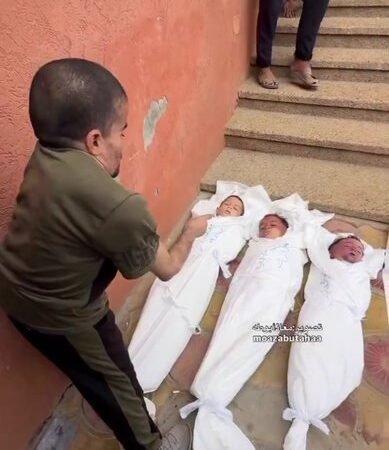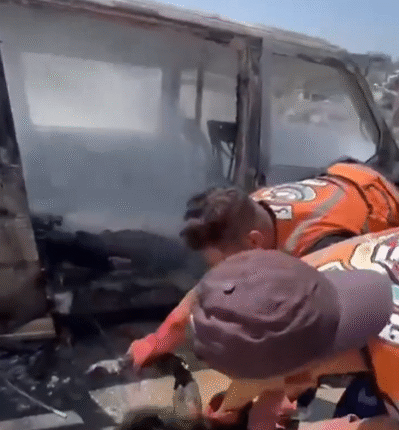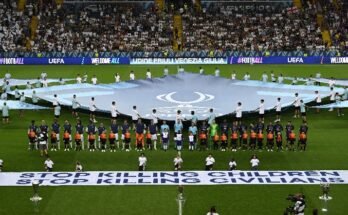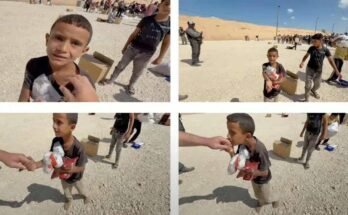Surrounded by destroyed houses and relentless bombing raids in the center of Gaza City, there is a father whose spirit embodies the quiet determination of the Palestinian people. A disabled father of four, Ahmed spends his days in a wheelchair. But his physical disability is not what defines him it is his unshakeable determination to protect his family while war is all around their lives.
Ahmed was wounded in an Israeli air raid a decade ago. Shrapnel cut through his spine, destroying any chance of walking. Life in Gaza has been a succession of hurdles since then restricted crossings, power cuts, shortages of medicine but nothing like the sheer destruction unleashed by this war has ever occurred. More than 377,000 Palestinians have died during the conflict since October 2023, according to recent humanitarian reports. Tens of thousands remain missing under rubble, and more than 1.7 million have been forced to flee their homes.
This war, which many human rights experts most recently, the UN Special Rapporteur have described as bearing the fingerprints of genocide, has rendered life all but unbearable for people like Ahmed.
During peace time, Ahmed had to rely on scarce aid—state-subsidized wheelchairs, state rations, and medical care from stretched clinics. Now, even these lifelines have been severed. His neighborhood pharmacy was bombed last month. The hospital a few kilometers away was flattened days later. When his daughter developed a fever, the family boiled leaves to make tea and hoped she would recover.
“I can’t play with my children when the drones fly overhead,” he says. “I can only embrace them and pray the next missile doesn’t hit our home.”
Gaza’s infrastructure is crumbling. Under four hours of electricity per day, no clean running water, and clogged or destroyed hospitals make disabled residents such as Ahmed among the worst-hit. Over 50% of Gaza’s healthcare facilities are not in operation, according to the World Health Organization. Those that remain operational can rarely provide specialized care for the disabled, let alone trauma patients or chronic disease patients.
Human rights observers have warned repeatedly that the toll of war on vulnerable citizens most notably the disabled, elderly, and children is catastrophic. Evacuation orders, most often delivered by text message or over a public address system, do not provide for consideration of those physically incapacitated from evacuation. When Israel ordered evacuations from northern to southern Gaza, Ahmed’s family and he were unable to move.
“I cannot push my wheelchair over the rubble. There are no cars. No wheelchairs. We’re stuck,” he explains.
These stories do not feature frequently in the headlines, but they reveal the grisly human toll of war away from the battlefields. When civilians are deliberately kept from the means of escape or survival, the war is no longer a campaign of arms it becomes a war against life.
As diplomatic efforts at truces have repeatedly failed, and humanitarian aid is denied or withheld at checkpoints, people like Ahmed are left silent suffering. Humanitarian organizations have pleaded to be given unrestricted access, but convoys are blocked or shot at. In one recent report, the UN warned that over 85% of Gaza’s population now exist in a state equivalent to famine, children perishing from malnutrition and dehydration.
“We are left behind,” Ahmed asserts. “Our lives are not figures. We are mothers, fathers, sons, daughters.”
The international community has a moral responsibility and a legal one to protect civilians in the midst of war. The Geneva Conventions demand protecting the wounded, the disabled, and all civilians. And in Gaza, that law has been violated each day.
Despite all this, Ahmed continues. He reads the Qur’an to his children at night to quiet their fear. He clings to what little food they have. He reads words of the Qur’an quietly, reminding them that in the darkest of moments, faith and honor must endure.
His is not a strange tale but it is untold. There are thousands like him in Gaza: disabled fathers, blind mothers, amputee kids. They are not only victims of bombs, but of neglect, blockade, and silence.
What is happening in Gaza isn’t a war it is a humanitarian collapse. It requires more than words of diplomacy from world leaders or platitudes of resolution. It requires action: corridors of aid, security guarantees, and justice for crimes against humanity.
If the world continues to turn a blind eye, then Ahmed’s story and stories of his ilk will be gone in the dust of Gaza. But if we listen, amplify, and act, maybe we can turn the tide.
At the end of the day, the bravery of people like Ahmed should not just be applauded. It should be protected.
Surviving Under Siege: The Story of a Disabled Father in Gaza



